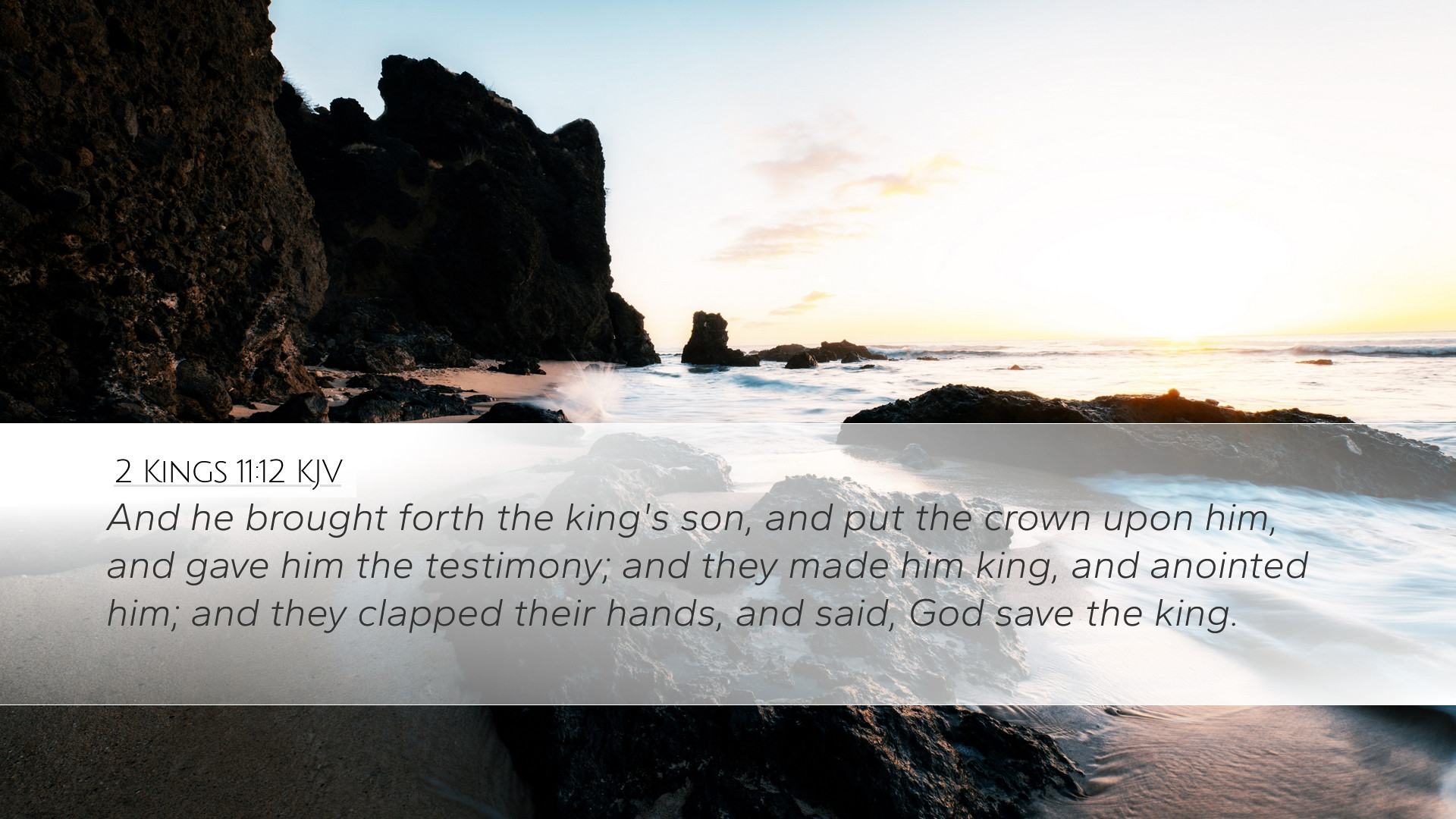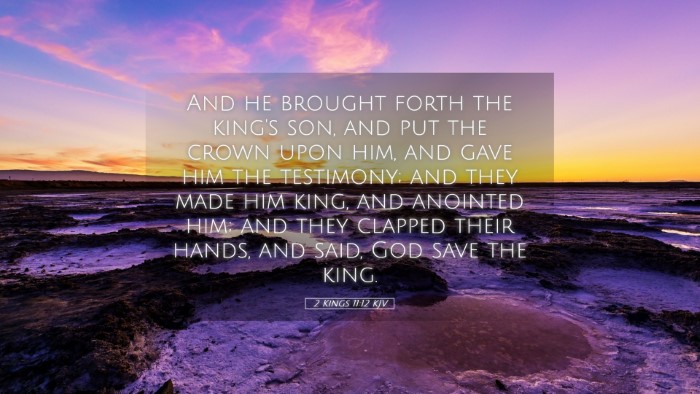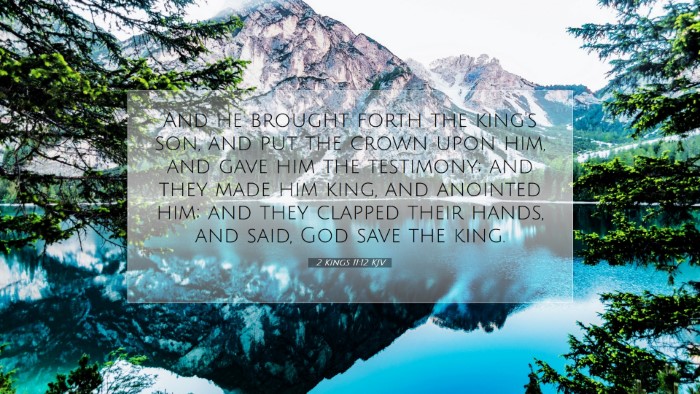Old Testament
Genesis Exodus Leviticus Numbers Deuteronomy Joshua Judges Ruth 1 Samuel 2 Samuel 1 Kings 2 Kings 1 Chronicles 2 Chronicles Ezra Nehemiah Esther Job Psalms Proverbs Ecclesiastes Song of Solomon Isaiah Jeremiah Lamentations Ezekiel Daniel Hosea Joel Amos Obadiah Jonah Micah Nahum Habakkuk Zephaniah Haggai Zechariah Malachi2 Kings 11:12
2 Kings 11:12 KJV
And he brought forth the king's son, and put the crown upon him, and gave him the testimony; and they made him king, and anointed him; and they clapped their hands, and said, God save the king.
2 Kings 11:12 Bible Commentary
Commentary on 2 Kings 11:12
Verse Overview: 2 Kings 11:12 states, “And he brought forth the king's son, and put the crown upon him, and gave him the testimony; and they made him king, and anointed him; and they clapped their hands, and said, God save the king.” This verse marks a pivotal moment in Israel's history, signifying the restoration of rightful leadership after a period of turmoil.
Historical Context
Political Dynamics: The political backdrop of this verse is characterized by the tyranny of Athaliah, who usurped the throne after the death of her son, Ahaziah. With her reign marked by violence and the eradication of royal heirs, the emergence of Joash as king represents a significant shift towards divine restoration.
Religious Significance: The importance of anointing as a public declaration of kingly authority is emphasized in this verse. Anointing serves not only as a ceremonial act but as a divine endorsement, reaffirming God’s chosen leadership.
Analysis of Key Phrases
"Brought forth the king's son"
This phrase underscores the work of Jehoiada, the high priest, who risked his life to protect Joash and to restore the legitimate line of David. It shows a strong contrast to the actions of Athaliah, who sought to extinguish the Davidic line.
"Put the crown upon him"
The crowning signifies recognition of Joash’s right to rule. It symbolizes the restoration of hope to a nation oppressed by darkness. Jehoiada’s actions here indicate that a new era was about to begin under God's providence.
"Gave him the testimony"
This refers to the covenant or the law, emphasizing the necessity for a king to govern according to divine principles. It serves as a reminder that earthly authority is grounded in spiritual fidelity.
"They made him king, and anointed him"
The act of anointing signifies God’s selection of Joash for leadership. Anointing is biblically a powerful symbol associated with the empowerment for service. This act represents sanctification for the task ahead, especially in a context where moral and spiritual decay had permeated the nation.
"Clapped their hands, and said, God save the king."
The acclamation of the people shows their support and joy over the new king. It reflects a collective hope for renewal and restoration in the nation’s spiritual and social order. The phrase "God save the king" also indicates a plea for divine favor and protection over Joash's reign.
Theological Implications
God’s Sovereignty: This passage highlights the sovereignty of God in orchestrating events for His purposes. Despite the apparent success of evil in the person of Athaliah, God preserves the line of David, demonstrating that His covenant promises endure.
The Role of Leaders: Leaders are divinely appointed. The selection of Joash through divine providence challenges contemporary leaders to acknowledge their accountability to God. This reinforces the importance of godly leadership that adheres to the testimony of God's Word.
Restoration of Worship: A restored king suggests the potential for restored worship and adherence to God’s laws. This serves as a call for renewal among God's people, driving home the necessity for both personal and communal re-dedication to the Lord.
Application for Today
- Hope in God’s Promises: Just as God was faithful in raising Joash, believers are called to trust in God’s faithfulness amid trials and tribulations.
- Responsibility of Leadership: Those in authority must be mindful of their calling and accountability before God, taking opportunities to lead in righteousness and justice.
- The Importance of Community Support: The support of the people for their king highlights the role of community in faith and governance. Believers are encouraged to affirm and pray for their leaders.
Conclusion
2 Kings 11:12 encapsulates a significant moment of transition from tyranny to rightful kingship, filled with implications for the leadership, community, and divine sovereignty. It resonates with the enduring themes of hope, restoration, and the necessity of righteous governance, which continue to be relevant in today’s ecclesiastical and societal contexts.


